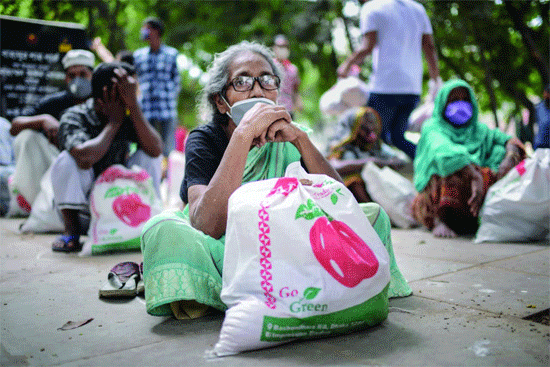New challenge over food security
Corona pandemic, climate change, price hike of essentials and reduction of arable lands are blamed
Golam Mostafa Jibon: As the food crisis is growing around the world including in Bangladesh due to the continuous price hike of essential commodities during the corona pandemic, the global food security is going to face unprecedented challenges.
According to the Food and Agriculture Organization of the United Nations (FAO), the prices of food products are now skyrocketing in different countries in the world including Bangladesh centering to the corona crisis. The organization claimed that the current feature is to be the highest in the last ten years.
FAO Chief Chu Tungyu recently said, “The global food security faces unprecedented challenges. The current world is at a critical juncture. The number of hungry people worldwide in 2020 was 81.1 million. At present, the number has increased more. The Corona epidemic is blamed for the global food crisis this year. But ongoing population growth around the world and the adverse effects of climate change are also responsible for it, which is posing threat to the future food security.
In such a situation, Bangladesh out of other countries in the world is also worried about food security. The Economic Relations Department (ERD) of the government has recently prepared a concept paper, where it has been mentioned that, food imports in Bangladesh have tripled in 10 years due to the growing population. The country’s population will increase by about 3 crore within 2031. The provision of sustainable and safe food has become a challenge due to natural disasters and increasing population.
So this time in the 76th session of the UN, food security was the main agenda of Bangladesh despite having many other important issues like political conflict equation and climate around the world. During the session, Prime Minister Sheikh Hasina reminded the world leaders about the challenges of meeting the food crisis amid the growing population and the adverse effects of climate change, which have fallen the negative impact on food production. In the case of Bangladesh, another thing that leads to most worries is the reduction of agricultural land due to rapid urbanization. That is why, the government is emphasizing on mechanization and expansion of agriculture through research. At the same time, increasing the income of farmers has also seriously considered. To this end, the government wants to implement an investment program of $ 2.9 billion or Tk 24,586 crore in the next five years. The World Bank, a multinational donor agency, has initially agreed to lend $ 500 million to the government’s mega plans. The amount in Bangladeshi currency is about 4,239 crore.
Md. Abdur Rauf, Additional Secretary (Planning) of the Ministry of Agriculture said, “The World Bank (WB) has shown
interest in lending to the proposed project. The Department of Agricultural Extension (DAE) has also started work on the Development Project Proposal (DPP).”
He also said that, the project will be implemented according to the approval of the Executive Committee of the National Economic Council (ECNEC), if it is considered profitable by the government.
According to the Ministry of Agriculture, a separate “Implementation Plan of Action” for the period 2021-2025 was formulated in 2020 under the National Agricultural Policy formulated in 2018. In light of the government’s Eighth-Five-Year Plan, the plan is estimated to cost $ 2.9 billion. The project has developed as part of the implementation of this action plan. The World Bank is working to present the loan proposal of the project to the board meeting in March next year. As part of this, the project will focus on increasing agricultural production, the use of technology and mechanization in uncultivated lands across the country, including char and hilly areas. In addition, quality seeds, loans and agricultural materials such as storage are also important to ensure.
Prime Minister Sheikh Hasina has already instructed that not even an inch of land in the country should remain uncultivated. The Ministry of Agriculture is also working towards that goal. Even in the current Corona epidemic situation, the yield of Aus and Boro paddy has improved last year. As a result of special incentives and overall supervision of the government, even after coping with these natural calamities, floods and droughts, the expected yield has been possible. The government is paying special attention to technology dependent agriculture to increase food production. The use of machinery is increasing in agriculture. Coming out from old idea and using modern technology are changing the life of the farmers. It will help to reduce cost and improve production capacity.
Analysts said, the government’s policy support is changing the situation in the agricultural sector. Agriculture has now become a lot with the touch of advanced seeds, fertilizers, technology and various sophisticated materials. As a result, as production has increased several times, similarly productivity has got difference. It is being expected that, the association of agriculture with machinery will be further strengthened with the passage of time.
Rare Israeli airstrike in Beirut kills Hezbollah commander and more than a dozen others
International Desk: Israel launched a rare airstrike that killed a senior Hezbollah milita…








